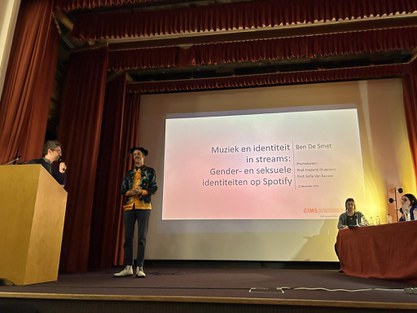CIMS member Ben De Smet successfully defended his doctoral dissertation
(12-12-2023)

Supervised by Prof. Dr. Frederik Dhaenens (UGent, CIMS) and co-supervised by Prof. Dr. Sofie Van Bauwel (UGent, CIMS), the dissertation explores the relations between music-streaming platform Spotify and gender and sexual identities. Music has historically been an arena, a tool, a companion for people to negotiate and articulate identities. It can have significant affective, emotional, intimate, social, and political value and power for both individuals and collective cultures. These dynamics evolve as the music landscape evolves, and this PhD examines the role of the relatively new phenomenon of music streaming in this regard. The central research question is the following: how does music streaming, Spotify in particular, mediate the relations between music and gender and sexual identities? To answer this question, Ben used four methods: a critical literature review, an app walkthrough, a textual analysis of playlists, and in-depth interviews.
Ben found that Spotify does indeed mediate both social and intimate (musical) lives: but this happens in a variety of ways, and five tensions are at work here, continua with extremes that are in constant dialogue with each other. Spotify contains tensions between user agency and platform control, between continuation and change compared to pre-streaming times, between the intimate and the social, between being something ubiquitous/mundane and something meaningful/profound, and between the concerns of commentators and experts and the pragmatic attitudes of users.
Intuitive, simplified accounts -both optimistic and pessimistic- of music streaming cannot account for the complexity and diversity of music-streaming practices. The dissertation proposes to take a critical, realistic but nonetheless optimistic perspective. The dissertation concludes that music remains a powerful tool for self-expression and identity work, and people with nonnormative gender and sexual identities are determined to use the complex environment of Spotify to create fulfilling intimate lives, meaningful social lives, and spaces where their identities can be shaped and articulated in full splendor.